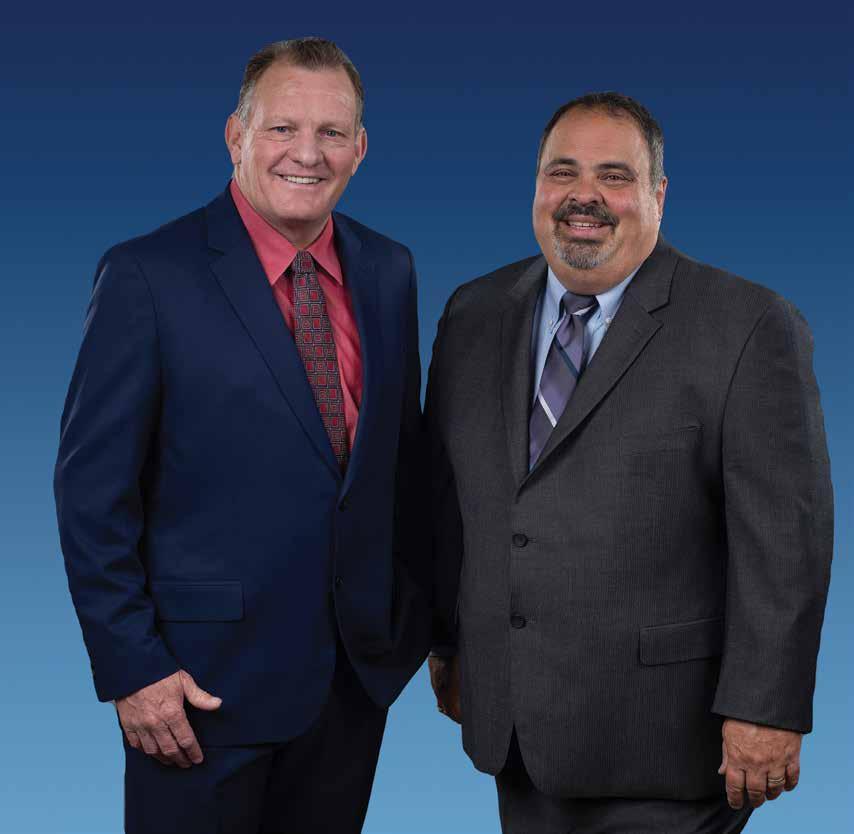
SMALL MAGAZINE YOUR GUIDE TO “BIG” BUSINESS ACHIEVEMENT FEBRUARY I MARCH 2021 / HOUSTON Restarting Your Small Business Following a Pandemic Keeping the Talent You Already Have Sales Tax Impacting Small Businesses in 2021 DISASTER RECOVERY ADVOCATES, LLC Roger Newman and Chris Macey -
Businesstoday
 President Barbara Davis-Levine
EVP/Executive Publisher Steve Levine
President Barbara Davis-Levine
EVP/Executive Publisher Steve Levine

Creative Director/ Editor Barbara Davis-Levine
Publisher’s Assistant
Jerome Davis
Graphic Design DesignsbyMalka.com
Photographers Gwen Juarez
Contributing Writers
Liz Armbruester
Heather Bendinelli
Tom Bloomer
James Bonadies
Barbara Davis Hank Moore
Michael Monyok
John J Murphy
Joe Pascaretta
Adii Pienaar
John Quinlan
Gail Stolzenburg Mary J. West
Chief Advisory Hank Moore
Publisher’s Advisory Board
Denise Adjei
Sonia Clayton
Donna Cole
John Cruise April Day
Dr. John Demartini
Maya Durnovo Kathie Edwards
Mila Golovine
Dory Gordon Richard Huebner Darryl King Wea Lee
Bertrand McHenry Hank Moore
Lisa M. Morton
Leisa Holland Nelson
Ingrid Robinson Maria Rios
Rita Santamaria
William Sherrill
Gail Stolzenburg
Mayor Sylvester Turner Jack Warkenthien
Phone: 832-419-2814
E-Mail: Steve.Levine@SBTMagazine.net Or Write: Small Business Today P.O. Box 31186 Houston, TX 77231 See us on the web at www.SBTMagazine.net
SMALL BUSINESS TODAY MAGAZINE IS PUBLISHED MONTHLY BY SANAA PUBLISHING, LLC. P.O. BOX 31186 HOUSTON, TX 77231 EXECUTIVE PUBLISHERSTEVE LEVINE: 832-419-2814 - WWW.SBTMAGAZINE.
CELEBRATING & SUPPORTING SMALL BUSINESS
Small Business Needs You!
More specifically, small business owners need your support and patronage now more than ever before. There is no question that the Covid-19 pandemic has wreaked havoc with our nation’s small business owners. Your patronage is how they cover their business expenses, feed and clothe their children, and try to stay healthy.
Growing up in Upstate New York, my entire family, who migrated from Poland, Russia, and the Ukraine to escape the Nazi terrorism and death in the concentration camps during the Holocaust, all became small business owners upon arrival. They were mainly in the fabric, tailoring, and apparel business with a few in the furniture and appliance business. So, I can relate to being the son, grandson, and great-grandson of one of those immigrants who ran a fabric business.
Regardless of the business, most small business owners are barely “hanging in there” and are just trying to stay alive.
Even if you are not in a position to be a customer of a small business owner at this time, there are ways you can help them today without any cost to you.
Here are some things that you can do right now to support others in your small business community:
1. Share a post of theirs on Facebook or other social media.
2. Like a post of theirs on Facebook or other social media.
3. Tag a friend who could use their products or services.
4. Write a positive comment, testimonial, or shout out about them.
5. Post a picture of you with the business owner, or post a picture of the interior or front of their business.
6. Follow and share their tweets and blogs.
7. Support a non-profit that the small business owner supports. You can show your support through your time, resources, and/or referrals.
As I witnessed with my own family, being a small business in the community means supporting the community in any way that they can. My mother was involved in civic improvement projects, scouting, garden clubs, and social work. My father was President of the local Board of Trade (Chamber of Commerce), Civil Air Patrol, and local veterans’ groups.
Such is the case with this month’s Cover Honorees, Roger Newman and Chris Macey of Disaster Recovery Advocates, LLC. The list of non-profits and community organizations that they support with their philanthropy and volunteerism, comes straight from the heart and helps define who they are. Even though Newman and Macey have busy lives, they take time to give back to the community. In this way, their lifesaving efforts extend to the underprivileged and less fortunate.
I know they would appreciate your support and after you read their story, you will appreciate why and understand how important it is for small businesses to support each other and the community.
Good Reading, Good Sales, & Success to YouSteve Levine
COPYRIGHT 2017, SANAA PUBLISHING, LLC. ALL RIGHTS RESERVED. REPRODUCTION IN WHOLE OR IN PART WITHOUT WRITTEN PERMISSION IS PROHIBITED.
NET
RATES ON REQUEST. BULK THIRD
PLEASE
MAGAZINE
I
2021 EDITION HOUSTON PUBLISHER’S COLUMN
ADVERTISING
CLASS MAIL. POSTMASTER:
SEND NOTICES ON FORM 3579 TO P.O. BOX 31186 HOUSTON, TX 77231. ALTHOUGH EVERY PRECAUTION IS TAKEN TO ENSURE ACCURACY OF PUBLISHED MATERIALS, SMALL BUSINESS TODAY
CANNOT BE HELD RESPONSIBLE FOR OPINIONS EXPRESSED OR FACTS SUPPLIED BY ITS AUTHORS.
FEBRUARY
MARCH
SMALL BUSINESS TODAY MAGAZINE Businesstoday SMALL MAGAZINE
Executive Publisher
Edward, Felicia, Jocelyn, And Brittany EuseryThe Eusery Team - Texas United Realty

One Family Working Together as a Team, Treating Your Family Like You’re Part of Theirs
By Barbara R. Davis
From the time they were married, Edward and Felicia Eusery have loved investing in real estate. Over the years, Edward’s career required them to move many times. In doing so, they gained an unbelievable amount of knowledge in the real estate process and became totally enamored in buying and selling homes. Their excitement was so contagious that their daughters, Jocelyn and Brittany, became involved in the transactions, as well. The thrill of house hunting inspired the desire to help others achieve their dreams of home ownership. In addition, they wanted to work together as a family team with a goal in the future of having their own brokerage. Most of all, they made it their mission to treat their clients like they’re part of their family. So, within a few months of each other in 2018, Jocelyn, Felicia, and Edward got their real estate licenses and The Eusery Team of Realtors® began.
Whether it’s residential or whether it’s commercial, The Eusery Team has personal experience dealing with the buying and selling process and are passionate in wanting to help others have the best experience as well. Edward explains, “Homes are usually one of the greatest investments people have in their lifetime. It became our goal as a family team to help people get what they want and need to make their real estate dreams and goals come true. We’re all very willing to work hard for our clients. We care for our clients, past and present, and we want to put a smile on their face.”
The Eusery Team is willing to work with clients from all financial brackets. They don’t shy away from difficult situations. Explains Edward, “We attack them with the same purpose that we do with easy transactions. It’s not about the money. We believe that if you do right by your clients, everything else is going to come.”
Felicia believes that a lot of their rapid success can be attributed to their teamwork ethic. She elaborated, “We work well together; we know each other’s strengths; and we collaborate on all the transactions together. It’s never one
individual working on the transaction; we all work for that client. Our clients aren’t just getting one Realtor®; they’re getting the entire team!”
Even though they work in other careers besides real estate, from the get-go, The Eusery Team has taken an aggressive, full-time approach in servicing and marketing their clients in a variety of creative ways. They each have their unique strengths that complement each other. Jocelyn, who is an accountant, handles the social media and marketing that includes Facebook, Instagram, and Twitter. In addition, she is responsible for creating flyers that are distributed throughout the community.
The Eusery Team also uses state-of-the-art, augmented reality links in providing photos, videos, and information on listings that can be updated daily if needed. The free app for the public to use is called Uncover Everything and they can open the app and scan The Eusery Team’s listing photos that will then provide information on whatever has been set up. The Eusery Team also uses QR Codes on the real estate signs that are put in front of their listings. They’ve had great success in selling the homes that have been marketed that way. Never complacent or humdrum, they’re always in search of the newest, most creative ways to help their clients sell their properties.
Felicia, who is a data management analyst, is someone who pays attention to the details. She is excellent in completing the necessary paperwork required for each real estate transaction; she knows the rules; and she is extremely well-versed in compliance. The Eusery Team’s reputation for excellence is a shining example to other Realtors® on how to do things the right way.
Edward Eusery, who is a global operations manager, is more of the communicator. He
handles all the advertisements that go in the Greensheet and on Craigslist. Even though Edward is well-rounded in all areas regarding real estate transactions, he is excellent when it comes to explaining the ins and outs of investing. Edward adds, “Jocelyn is very good communicating with everybody but she’s especially good communicating with her own age bracket, i.e., millennials.”
Brittany Eusery, who is the Team’s administrative assistant, is the youngest in the family. Currently, she is a senior in college and in the final process of getting her real estate license. The Eusery Team’s slogan, “Our family helping your family with your real estate goals and dreams,” is quite apropos, explains Jocelyn. “We’re family and that comes out when we work with people. When our clients move into a new home, they feel good when they have somebody who comes across more as a family and really wanting to help them out and not just as a Realtor®.” That indeed sets The Eusery Team apart from the rest!
For more information on how The Eusery Team can help you with your real estate investments, residential and commercial, email Edward at edward@eusery.com, Felicia at felicia@eusery.com, or Jocelyn at jeusery@gmail.com. You can contact Edward by phone at 713-487-7272, Felicia at 812-589-2927, and Jocelyn at 812-760-2577. Like them on Facebook at The Eusery Team (Facebook. com/BuySellHomesHTX) and find them on Instagram as EuseryTeam.Realtors.
PROFILE REAL ESTATE PROFESSIONALS Businesstoday
MAGAZINE
SMALL
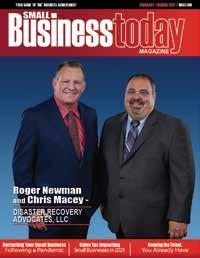
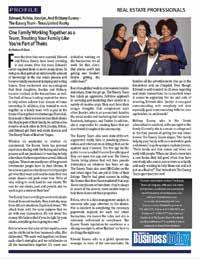
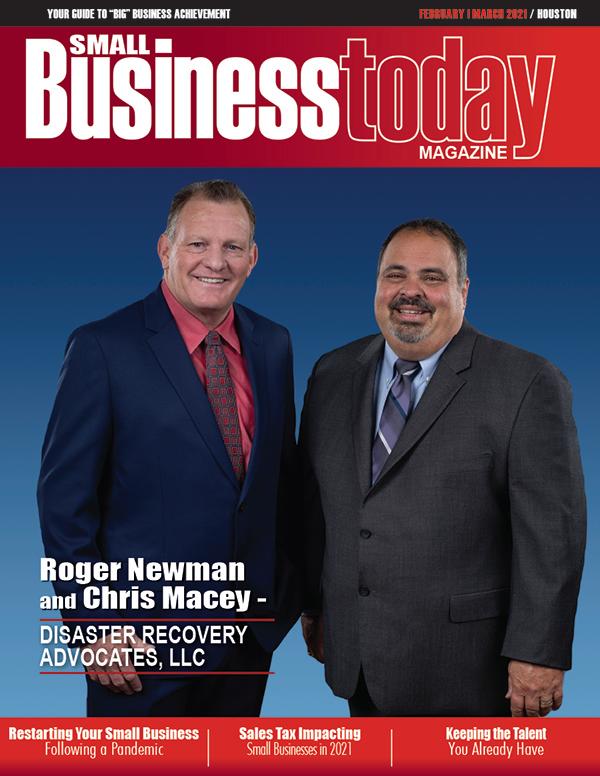
INSIDE FEATURES 01 Publisher’s Column 10 What Really is the Big Picture of Business? 11 Networking During a Crisis 12 What Does it Take to Lead a Small Business Through Crisis? 13 Restarting Your Small Business Following a Pandemic 14 How to Keep Your Small Ecommerce Business Afloat in Times of Crisis 15 3 Ways to Properly Train Your Employees in Our COVID-19 Era 16 How to Make Extra Income While Helping Your Community 17 Keeping the Talent You Are About to Lose 18 Sales Tax Changes That Will Impact Small Businesses in 2021 19 How California’s New Cybersecurity Law Might Affect Your Business (Even if You Aren’t in California) 21 The Value of CEO Personal Power 22 Wisely Breaking the Industrial Dam FEBRUARY I MARCH 2021 EDITION HOUSTON 04 02 COVER STORY EUSERY TEAM PROFILE
Roger Newman and Chris MaceyDISASTER RECOVERY ADVOCATES, LLC
BY MARY J. WEST
Roger Newman, founder of Disaster Recovery Advocates, LLC, a licensed public adjusting company, has always looked out for his clients’ best interests when they were at their lowest point; when they were going through the unthinkable... a national disaster or other catastrophic event. Many businesses would have gone under if Roger, a true lifesaver, had not been there to help them stay afloat. His expertise in so many facets of the construction industry and his genuine desire to guide businesses through the perils of insurance claims has led him to excel over his competitors, but never complacent with his business, Newman recognized he could improve Disaster Recovery Advocates even more. After working separately but parallel with Chris Macey, whose expertise has
been in the insurance industry as an executive general adjuster, Newman saw the advantage of joining forces and forming a partnership. Now the dynamic duo of Roger Newman and Chris Macey are the driving forces behind Disaster Recovery Advocates, LLC. They are the best lifesavers out there when it comes to helping a business owner or homeowner get everything they are entitled to when they are dealing with a disaster!
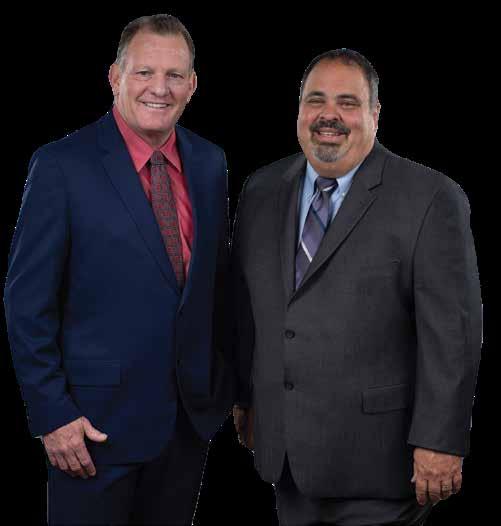
Over the course of several decades, Newman has acquired an abundance of skills in multiple facets of the construction industry. Growing up on a farm in Alvin, Texas, Roger did his fair amount of chores that was expected of him while attending school. One of the few things that interested him in high school was his
woodshop class. Even though his uncles and grandfather were millwrights, Roger’s appetite for carpentry was whetted. After leaving high school, his grandfather got him into a carpenter, millwright, and pile driver joint apprenticeship program. Eventually, this led him to become a journeyman carpenter by trade, the first and only carpenter in his family!
Later, Newman expanded on this early training by studying the international building code and international residential code so he could work as a building inspector. Yet, this was only the beginning of his acquisition of skills that would serve him so well in his future endeavors. Over the years, Newman’s knowledge in all things pertaining to the building industry has become deep and broad. In addition to employment as a carpenter and remodeler, he has been a roofer, glass worker, and an iron worker.
After some time, Roger began to delve into an area that involved more responsibility, that of a construction estimator. This position, together with his previous work, equipped him for yet another role to add to his impressive resume — building consultant. “So, the building consultant work takes on a whole new dimension in my opinion,” Newman says. “Developing the scope of work is far beyond the work involved in being a building estimator. Consultants need to have in-depth knowledge of how perils affect a building. Perils include flooding, fire, hail, lightning, windstorms, and hurricanes. These are the hazards against which buildings are insured. To illustrate, if the building in which you are a consultant floods, you need to know how the water affects all the building’s components. Also, when a fire occurs, you need to understand that it causes smoke, soot, and heat damage, along with water damage from the firefighting.”
Clearly, the building consultant’s role requires a complex body of knowledge. When you factor Roger’s competence in this area with his other skills, it gives him a sure foundation for all aspects of the building industry. The consultant work eventually led to training that would prove pivotal. In the course of his work, Roger encountered claims adjusters and felt challenged by their knowledge.
COVER STORY
Photo by Gwen Juarez
Roger and Chris are terrific partners and great friends!
Lifesavers Helping Businesses Stay Afloat During Disastrous Times
When dealing with an adjuster, they would try to intimidate him because they had a license and he did not. That was the impetus for Roger to further his education in that area. After taking claims adjusting classes, he obtained a public adjusters license to handle claims for residences and businesses.
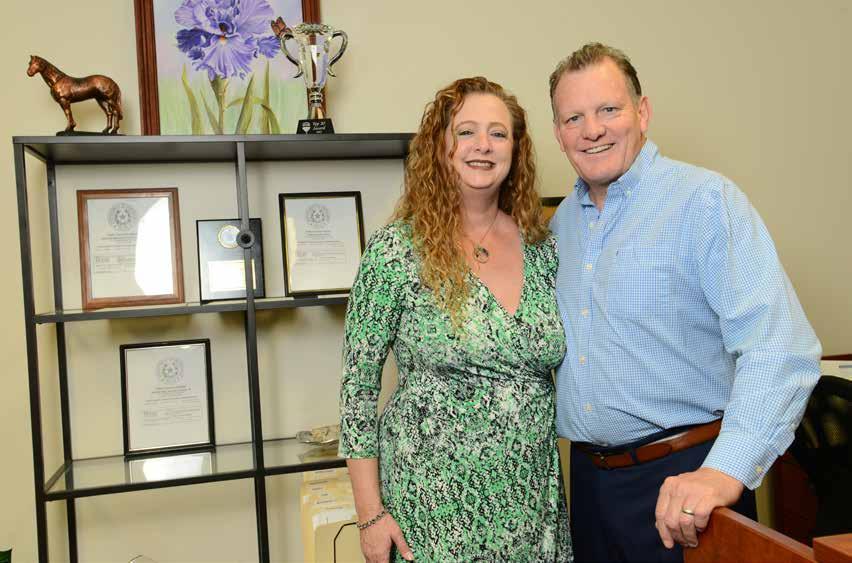
In January of 2019, Newman harnessed his skills in claims adjusting to form Disaster Recovery Advocates, LLC. The business quickly grew, and more employees were brought in, including additional licensed public adjusters. The profitability of the business bears testament to Roger’s extensive competency, as well as his talent for hiring the right people. A lot of the growth of Disaster Recovery Advocates can be attributed to Newman always looking out for his clients’ best interests first and foremost. Another reason is because he loves what he does. He does not consider it work. He finds it so enjoyable that he compares it to playing in a sandbox. “When I must work 12 hours to 14 hours a day, I do not look at it as work. I view it as just playing in my sandbox longer that day. Like my father-in-law, a CEO of the YMCA, once said, ‘I never felt like I went to work one day.’”
Saving peoples’ businesses and homes means a lot to Roger. Anyone who has a conversation with him can hear his sincerity and care in his voice. That is not something someone can fake. You might even say that Roger is kind of like Will Rogers. He seems to like everyone, and it shows. He exclaimed, “I have
always been a people person. I just like talking to folks and have never met a stranger!”
Newman’s partnership in 2020 with Chris Macey came about after the two men spent hours schmoozing together in a restaurant. Following their extensive conversation, it was evident that a potential existed for the two men to form a symbiotic relationship. The entrepreneur offered Macey the partnership because his areas of expertise would fill a gap in Newman’s company. “I am a big advocate of knowing what you do not know,” Roger says. “Chris has claims management experience, and he knows the process better than anyone. My specialty areas are consulting and business development.” Because Macey’s focus is claims adjusting and Newman’s focus is consulting and business development, their strengths complement each other, which makes them a perfect team.
“Nobody can do everything. There is no way you can be the chief, cook, and bottle washer,” Newman emphasizes. He feels that the strength of a business is due to the collective strengths of each partner and employee. Macey fully agrees with Newman’s know-what-you-do-not-know philosophy and recounts an incident in the life of Henry Ford to illustrate it. “A lawyer put Henry Ford on trial to make him look like an idiot. The lawyer asked Ford questions, such as ‘What is the price of tea in China?’ Ford answered something like, ‘Why do I need to bother to fill
[ FEBRUARY I MARCH 2021 ] WWW.SBTMAGAZINE.NET 5
Photo by Gwen Juarez
Roger’s lovely wife, Kimberly, is his partner in life and everything he does!
my mind with trivial things like that when I could hire 100 people to answer those questions for me?’” “Ford’s wise reply,” explained Chris, “underscores a key concept for a healthy company: a business owner should do what he does best, while hiring people to do what he cannot do well. In other words, if you are not good at bookkeeping, hire a CPA; or if technical things are not your strong suit, hire someone who is.”
Once the Newman-Macey dynamic duo started, it did not take long to flourish. Aside from complementing each other in skill sets, the men seem to click on a personal level. They think alike and get along great. Both men find the public adjusting business a great industry in which to work. Many people are unfamiliar with what a public adjuster does. Consequently, when their businesses or homes are harmed, they rely on the adjusters from their insurance company to assess the damages. They are not aware that an alternative is available to them. Unlike staff and independent adjusters, who represent an insurance company, public adjusters work solely for the policyholder.
Chris feels part of his role in Disaster Recovery Advocates is to educate potential clients. “There is a lot of misinformation out there. It is my mission to let people know they have a right to have their damages assessed by someone other than their insurance company adjuster. In fact, I highly recommend it.” He encourages potential clients to hire a public adjuster, even if they choose not to hire him. “People need someone who understands the challenges ahead of them. Instead of going it alone, it is an advantage to find someone to hold their hand and guide them through each step. If they do not do this, the outcome will not be good. They will make costly mistakes.”
Using a public adjuster is worth the fee, because the professional becomes a partner with the client, working for his or her benefit. A public adjuster can
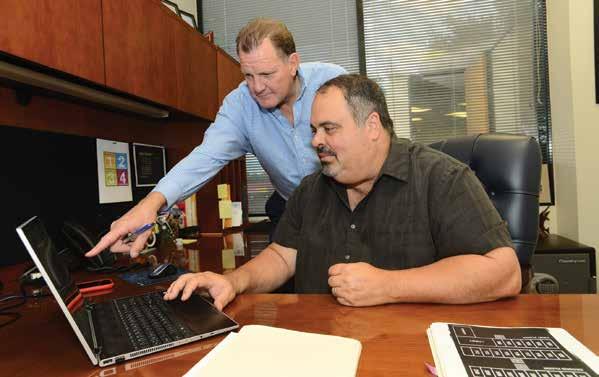
change the recovery amount, and the difference can sometimes determine whether a small business remains viable or must fold due to losses. “If a business folds, it means all the blood, sweat, and tears involved in building it go down the tube,” Macey explains. In expounding on the benefit of hiring a public adjuster, Chris talks about the enormous value of a home. “It has within it your personal effects, such as heirlooms, baby pictures, wedding pictures, and all the things people treasure. Aside from these things, a home has great monetary worth. If a person cannot recover from these losses, it can have far-reaching implications. For example, it may result in a lack of money to fund a child’s college education.”
Macey also mentions another benefit of having a public adjuster to help maximize the recovery of losses. “The enormous stress people feel when large assets are in jeopardy can affect their physical and mental health.” Because of the benefits involved in their work as public adjusters, Macey and Newman can be quite the lifesavers to their clients. They are lifesavers because their work helps restore businesses, as well as relieves disasterinduced stress on the owners.
Chris explains that even though his job involves math, a skill in which he had no interest in school, it is the human application of that skill that has lit an
inner fire in him. “My work as an adjuster involves math, but there is a human connection to it, which is the critical difference. Everything we do makes or saves money for our clients. And we do whatever it takes to make them happy. This is extremely rewarding to us.” Another key part of Macey’s job fulfillment lies in his ability to empathize with clients. “To be a successful consultant and public adjuster, you need to be able to feel what clients are going through and truly care about it.”
This caring mindset has motivated Roger to research solutions when he encounters a construction problem in which he is not knowledgeable. “I will look at something and go ‘that stumps me a little bit.’ Then, it is time for me to do my research. I have done it hundreds of times.” Roger also likes to acquire knowledge from others, as well as teach what he has learned with colleagues in the industry. For instance, his experience as a building consultant led to the development of preprinted forms, which makes documenting property damage a lot easier. The forms contain the estimating codes for writing estimates in Xactimate, facilitating the documenting process to go smoothly. When Newman notices adjusters writing in a notebook, he gives them the forms. In return, his colleagues are unfailingly grateful for the helpful, time-saving tool.
6 SMALL BUSINESS TODAY MAGAZINE [ FEBRUARY I MARCH 2021 ] COVER
STORY
Photo courtesy of Bill Rosemon
Roger and Chris perfectly complement each other in every facet of their business!
Photo by Gwen Juarez
How do Newman and Macey get clients? According to Newman, building relationships is the best way to get them in today’s world. He believes it works better than advertising. “You can spend a ton of money either through social media or in pay-per-click ads on the internet. You can also put expensive ads on billboards, radio, or TV. However, probably 90 percent to 95 percent of our business comes from referrals. Word of mouth is the most effective.” This method of getting clients is one of the things these partners have learned by trial and error. “We have had to discover many things this way,” says Newman and Macey.
Another thing Newman has learned is that there is a right way and a wrong way to speak to clients. “You need to know what you do not know, otherwise it can hurt you. To illustrate this point, I used to ask potential clients, ‘When was the last time you read your insurance policy?’ After I asked that a few times, I realized it came across as a little too cocky and arrogant. It is not my nature to want to offend anyone.” “To sum up what to expect in business,” states Roger, “get ready for the good, the bad, and the ugly, because it all comes. Every business has bad days, so do not be unduly discouraged when they happen. Hang in there and enjoy the ride.”
laurels. He is always seeking ways for growth. He enjoys educating himself, and with this intent, he goes to networking events that feature speakers on diverse topics that may have a bearing on the building industry. “I am interested in anything to do with real estate because it really kind of springboards right into what we are doing.” In addition to working in his business, Newman is an active member of the Texas Association of Public Insurance Adjusters (TAPIA), a trade organization that promotes ethics and professionalism in the industry. The group hosts conferences every spring and fall. This past year, Roger had the honor of serving on the conference committee.
is not essential for success, but it definitely helps. If you do not have that advantage, you will spend many years like Roger has in educating yourself,” explains Chris.
Newman takes great pleasure in being on the HLSR committee. “I especially like developing friendships. When you join, like any other organization, you take on a whole new family,” remarks Newman. “It just happens that the rodeo family is huge - boasting 33,000 to 34,000 members. When you see a person wearing the bowed leg H pin (nicknamed Howdy), it creates an instant bond, because you know that person is doing their part in raising money to help kids in Texas get an education.” The philanthropic efforts of Disaster Recovery Advocates are not just limited to HLSR. “I have also been involved in some other great fundraisers for nonprofits,” says Roger. “Last year, we made substantial donations to the Vishal Raju Bhagat Foundation that raises money for juvenile diabetes, and to the Leva Patidar Samaj of Houston that promotes youth leadership and provides scholarships.
Besides residential claims, Disaster Recovery Advocates are considered the absolute best when it comes to assisting commercial and industrial property owners with their recovery! This photo of the Motel 6, located in Lake Charles, Louisiana, was taken after the area was totally devastated by 2 hurricanes in 2020!

Macey concurs with Newman’s advice to be positive. “I came from a poor family who lived on a farm,” he says. “I had nothing in those days, but things can sure change. When you talk to a client, you need to have the mindset that you are already hired.” Roger and Chris also try to think of different ways to solve problems. Because everyone has creativity deep within, Newman and Macey advocate tapping into that. “All you need is to have confidence that there is nothing you cannot do,” they contend.
Although the business is going great, Newman is not content to rest on his
Even though Newman and Macey have busy lives, they take time to give back to the community. Like many successful business owners, they derive much satisfaction in philanthropic endeavors. In this way, their lifesaving efforts extend to the underprivileged. They help raise money to send youth to college through their involvement on one of the many committees of the Houston Livestock Show and Rodeo (HLSR). “I believe the organization has raised more than $400 million,” elaborates Roger. “Since I did not have the opportunity to attend college when I was young, I have a passion to make sure kids from families with limited means get this opportunity.” “When I was a kid, it took a lot of money to get a higher education; but now, it involves a crazy amount of money. A college degree
I have family members who have died from diabetes, so it really strikes home. I am very proud to be a part of these worthy organizations.”
Disaster Recovery Advocates are true to their lifesaver website logo because they are rescuers in so many ways. Their philanthropy helps secure brighter futures for youth who cannot afford a college education. Their work saves irreplaceable business assets while protecting business owners from financial ruin when they are facing devastating losses. They act as an extra eye and voice in making sure business owners and homeowners who file insurance claims get the settlement to which they are entitled, which in turn helps them restore their property to what it was before the disaster struck. Newman, Macey, and their team are truly rescuers in times of great distress.
[ FEBRUARY I MARCH 2021 ] WWW.SBTMAGAZINE.NET 7
Photo courtesy of Disaster Recovery Advocates
Words of Wisdom from Newman and Macey
1. Partner with someone who is strong in areas where you are weak. In other words, look for a partner who complements you. If you are yin, look for someone who is yang. Remember, the success of a business depends on the sum total of all of its parts. If a business has an area in which at least one partner does not excel, it can affect the bottom line. When you form a business, try to think of all the skill sets you need and make sure you have at least one employee who has expertise in each area.
2. Enjoy your work. If you do, the passion, energy, and enthusiasm needed for a flourishing business will follow. When you take pleasure in your work, instead of considering it a drudge, you will look forward to getting on the job every day. Look for work that will be a labor of love.
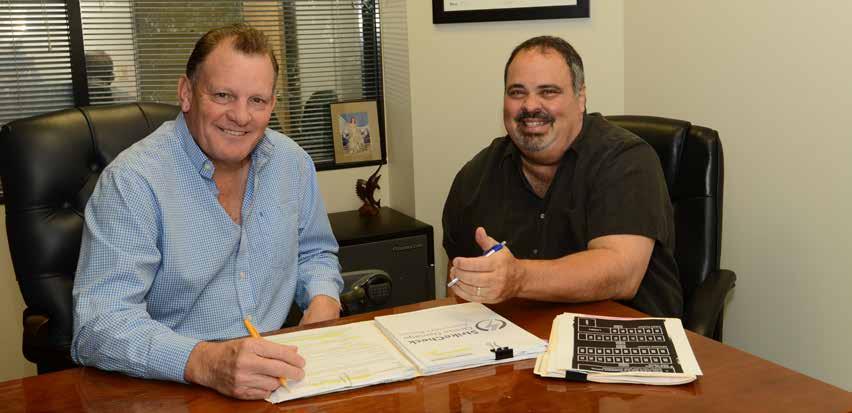
3. Savor the delight that comes from helping people. After a hard day’s work, nothing is more gratifying than knowing your efforts have met an important need in someone’s life.
4. Know what you do not know. You are sure to have expert knowledge in some things. However, recognize your limitations, and seek help from people who are more experienced in those areas. Keep in mind that no one knows everything.
5. Aim high. Even if you do not reach your goals, setting them high will help you achieve more than setting them too low. For instance, in high school, Macey ran for class president. Although he did not win, he had the honor of being class treasurer.
6. Be a giver. This is an admonition for all people, regardless of their level of success. If you give out of the goodness of your heart, it comes back to you tenfold. So, donate and help a good cause. It is one of the best things you can do today.
7. Admit what you do not know. When encountering questions from clients in which you do not know the answer, do not try to wing it or say something irrelevant. Be honest and admit you do not have the answer. You can say, ‘That is a good question. I will get back to you after I do some research.’ Such honesty fosters trust.
8. Do research before starting a business. Since all types of businesses are highly regulated, know what you are getting into before you start. Plan for the worst and pray for the best.
9. Be humble. We all make mistakes, so take ownership of them. Accept responsibility for the mistakes of your employees. When an employee in your business makes a mistake, realize that you may have either failed to train them to do something properly or failed to make sure they followed the right procedures. Never put the blame on a person below you.
10. Do not quit. So many people get close to a goal but quit too soon. We encourage you to read stories of the gold miners in California during the Gold Rush who quit when they were only three feet away from finding gold. The moral of the story is to have determination. Anybody can do anything with all the resources available in life. Do not be afraid to take a leap of faith, and when you do, do not give up.
8 SMALL BUSINESS TODAY MAGAZINE [ FEBRUARY I MARCH 2021 ]
Photo by Gwen Juarez
O dds of a child becoming a professional athlete: 1 in 16,000




of a child being diagnosed with autism: 1 in 88


Some signs to look for: No big smiles or other joyful expressions by 6 months.
No babbling by 12 months.
No words by 16 months.
To learn more of the signs of autism, visit autismspeaks.org

[ FEBRUARY I MARCH 2021 ] WWW.SBTMAGAZINE.NET 9
Odds
© 2012 Autism Speaks Inc. “Autism Speaks” and “It’s Time To Listen” & design are trademarks owned by Autism Speaks Inc. All rights reserved.
What Really is the Big Picture of Business?
BY HANK MOORE CORPORATE STRATEGIST™
The biggest problem with business, in a onesentence capsule, is: People exhibit misplaced priorities and impatience...seeking profit and power, possessing unrealistic views of purpose, and not fully willing to do the things necessary to sustain orderly growth and long-term success.
What organizations and individuals started out to become and what we’ve evolved into being are decidedly different things. The path toward progress takes many turns, expected and unexpected. How we evolve reflects the teachings, experiences and instincts that are not part of formal education.
Pressures continue and accelerate for companies to stay in operation, become competitive, keep ahead of the marketplace and perform quality work. Businesses of all sizes are besieged with opportunities, competing information sources and large amounts of uncertainty.
Executives are not fully prepared to handle challenges of the moment, much less to begin developing Big Picture thinking. Seasoned executives face burnout daily. Much of the workforce is in transition, with unclear anchoring of where they’ve been and where they could head. Young and mid-level workers do not really know what it takes to succeed long-term and are, for the most part, impaired from optimum achievement.
Failure to prepare for the future spells certain death for businesses and industries in which they function. The same analogies apply to personal lives. Greater business awareness and heightened self-awareness are compatible and part of a holistic journey of growth.
The term Big Picture is often used but rarely applied correctly. If one believes vendors and niche consultants, the Big Picture is what their specialty is. It may be: human resources, organizational development, training, technology, sales, marketing, advertising, public relations, coaching or financial management. Few of those have actually written Strategic Plans and do not really comprehend what the Visioning process actually is.
Thus, few in business know how to frame, craft and sustain a Big Picture of business. There are reasons:
• Niche consultants say that their niche is The Big Picture, and the uninformed accept that.
• Vested interests have a stake in keeping certain niche consultants in the driver’s seat.
• Business school education is limited and behind the times.
• Fear of change forces people to go to extreme lengths to defend their turf.
• Spin doctors mine the fear and represent the vested interests of niche service providers.
• People in business are so overwhelmed that they do not know any better.
• A great many people set up barriers to learning anything more than is what is on their radarr.
Businesses usually stop growing because they have failed to make investments for future company success. Rather than plan to grow and follow the plan, they rationalize organizational setbacks, excuse poor service or quality, and avoid change, all the while denying the need for change and avoiding any planning. Too often, they rely upon what worked for them in the past, on buzzwords, and on incomplete strategies. We’ve all seen businesses in which a paralysis creeps in, keeping them from doing anything at all.
A growth plan or strategic plan is essential for any organization that intends to survive and thrive in today’s rapidly changing business environment. Companies need to heed messages from the marketplace telling them of changing market conditions, new global business imperatives, new partnering concepts, recognition of new stakeholders, and other changes outside of their influence that may profoundly affect them.
Contact information for Hank Moore. Website: http://www.hankmoore.com Email: hankmoore4218@sbcglobal.net Phone: (346) 777-1818
Hank Moore has advised 5,000+ client organizations, including 100 of the Fortune 500, public sector agencies, small businesses and non-profit organizations. His Legends books have been nominated for the Pulitzer Prize.

10 SMALL BUSINESS TODAY MAGAZINE [ FEBRUARY I MARCH 2021 ]
FEATURE
EDITORIAL
BY GAIL STOLZENBURG
Networking During a Crisis EVERYTHING CHANGES IN A CRISIS
Communities like Houston have experienced hurricanes, flooding, pandemics, and economic downturns affecting the ability to be face to face with prospective clients. Your conferences and networking events been cancelled and people have to work from home. You may be experiencing the fear of making a change, which is totally normal. Remember fear and faith are unable to coexist in your mind. New rules are in place like social distancing and people are resorting to Virtual Networking.
There’s little difference between physical and virtual networking. Connecting specialist Jonathan Sprinkles says “Connection is the foundation of every long lasting profitable business relationship” and both methods work very well. Most of communication is through body language and by using the phone or email we are unable to see the person’s body language. But, now there are tools where you can see someone’s facial expressions and at least some body language. Think PIVOT and look at networking from a different prospective.
International Sales Trainer Eric Lofholm says “The big thing with virtual networking is your own mindset and expanding your comfort zones. You may be used to always networking in person. It is comfortable for you. So networking in a virtual format is a new muscle to develop. It comes down to trust and rapport, identifying customer needs, and sharing benefits and getting appointments. Think about mindset as a strategy. Start by writing down every
day what you are grateful for and write down your plan on how to have a productive day.
“THE #1 SKILL IN NETWORKING IS CONSISTENCY”
Sincerely caring and wanting to help others will increase your influence. Find an excuse to follow up with someone you’ve lost touch with. Spend more time connecting with people online. Follow up with those you have presented to before. Build relationships with those who are forced to work from home. Post content that helps others. Be different –Stay positive. The #1 skill in networking is consistency.
You accomplish the most work the day before your vacation because you focus. You can use the same technique in connecting. Top networking trainer Simon Chan calls it “artificial time”. He teaches to set a timer for five minutes and makes as many new contacts as you can. The next five minutes provide information to your contacts and the third five minutes follow up on previous contacts. This 15-minute exercise can be repeated throughout the day.
Having to maintain social distance is an excellent opportunity to develop
a mastermind with people who have backgrounds and viewpoints different from yours. You will help each other. It is also a time to find a mentor - someone who is doing what you want to do, who began at a point lower than you are, and became very successful. Associate with new and different people. Remember your income is the average of the five people you associate with the most.
This is the perfect time to update your networking tools like social media platforms and learn more about virtual connecting technology. The best thing you can do right now is to produce, make a contribution. Become the best version of yourself and get comfortable networking virtually. The technology makes no difference. Do your research, pull the trigger and go. If you are thinking about changing careers, this is a great time to contact professionals in your area of interest.
“Networking remotely isn’t difficult at all,” notes Rosina Racioppi, CEO of Women Unlimited, and author of a book about networking called Relationships Matter, “The only obstacle to building a great network virtually is that so many people working at home, especially for the first time, forget to do it.” -
Gail “The Connector” Stolzenburg
Author of CONNECTIONS: Contacts to Clients Gail@GailStolzenburg.com (281) 493-1955 www.GailStolzenburg.com

[ FEBRUARY I MARCH 2021 ] WWW.SBTMAGAZINE.NET 11
LET’S NETWORK! -
EDITORIAL FEATURE
What Does it Take to Lead a Small Business Through Crisis? Insights from a Miracle-Minded Manager
BY JOHN J. MURPHY
During a time of crisis, certain fundamental leadership characteristics become increasingly important. The COVID-19 pandemic has led us to be in complete lockdown, surrounding us with fear, ambiguity, and doubt.
WHAT DOES IT TAKE TO LEAD A SMALL BUSINESS THROUGH THIS CRISIS?
Lead with passion, courage, and faith. Recognize that the fear-based thoughtsystem does not help during times of crisis. People do not want to follow a fearful leader. Allow yourself to be an instrument of peace and a channel of wisdom. Do this by allowing your inner energy to flow, filling it with passion and courage. People around you will begin to feel different. They will feel more confident, more optimistic, more creative, and more inspired.
Be mindful of time and opportunity. Recognize that we still have the same amount of time in a day. 24 hours. What are you going to do with it? Will you waste it on unproductive activities and distractions, or will you allocate it to new opportunities? If you are a musician, is it time to write that original song you’ve been thinking of? If you operate a manufacturing facility, is it time to offer something the world desperately needs? If you are a business manager, is it time to offer a course online? One thing is for certain: There has never been a shortage of opportunity. Step back, relax, and open your mind to the endless possibilities knocking on your door.
Connect the dots. Entrepreneurs and small-business owners generally start
their businesses by applying instinct, intuition, and strategic thinking. We recognize opportunity by seeing patterns and linking one to another. We ask questions like “What if?” and “Why not?” We borrow best practices from industry to industry. What can we do to eliminate some of the limiting beliefs holding us back? Maybe this crisis is giving us more time to think—and to challenge the way we do it!
your business and boost customer experience. Outsmart the competition by finding new ways to reinvent your value proposition and market offering. Make yourself tough to copy.
Rise above the negativity and doubt
Consider the many positive outcomes of this viral attack on humanity—the healing of the planet, the renewed appreciation for a hug, the opportunity to step back, reflect, and reboot. Recognize that everything happens for a reason, a positive reason. Remain optimistic by refocusing attention. There is no problem without a solution. Find the solution.
.
Use this time to pull together. There is no better time to unite and reinforce the power of teamwork. When we cultivate a shared vision and purpose, we amplify the energy it takes to manifest results. This is called synergy, when one plus one equals something greater than two. Great leaders and business owners pull people together and generate synergy.
Concentrate on the “Wow!” Ask your team, “What can we do as a business to wow our customers, to give them something beyond expectation?” No one is “wowed” anymore when the car starts on the first attempt or when the lights turn on after we flip the switch. These outcomes are expected. We wow people when there is an unexpected value. Use this time of isolation to explore creative ideas that will differentiate
Lead with support
. A gardener knows that a lily requires sunlight, water, and nutrients to grow. It also needs obstacles—like weeds—to be removed. There must be a nourishing environment and a clear path for growth. Successful entrepreneurs and business leaders understand this truth. We have an obligation to give our teams a healthy culture, an environment where they can flourish with hope and enthusiasm. Be the enlightened leader who brings out the best in others by removing obstacles of fear, resistance, and doubt.
John J. Murphy is the founder and CEO of Venture Management Consultants, Inc. and is the author of Miracle Minded Manager: A Modern-Day Parable about How to Apply “A Course in Miracles” in Business. Email: jjmurphy13@comcast.net Website: https://www.johnjmurphy.org/

12 SMALL BUSINESS TODAY MAGAZINE [ FEBRUARY I MARCH 2021 ] EDITORIAL FEATURE
THE WORLD IS CALLING FOR INSPIRATIONAL LEADERSHIP.
Restarting Your Small Business Following a Pandemic
 BY JOSEPH PASCARETTA
BY JOSEPH PASCARETTA
Just a few short months ago, businesses across the U.S. applied for the funding offered through the Coronavirus Aid, Relief, and Economic Security Act (CARES Act). I watched friends who own small businesses navigate the loan process and do their best to stay afloat during an event unlike anything we have experienced in our lifetimes.
I was a small business owner during the last recession. It’s likely you had to make some quick decisions when the first wave of government closures occurred, like I did in 2008: deciding who to pay, where to find savings, and how to better serve your customers. Now that we are beginning to restart our businesses, I’d like to focus on what can be done proactively to better position it to survive potential future downturns.
Evaluate Your Business Relationships
Always look at your business holistically and on an ongoing basis to evaluate your customers, partners and suppliers so you can quickly scale back or change operations as needed in the face of any economic uncertainty that arises.
• Customers – Make sure you understand your customers’ needs by periodically checking in and asking them how you can help. This is especially important when their needs may have also changed.
• Vendors – If your supply chain was disrupted during the pandemic, you’ve already had to look for alternate vendors, suppliers, or service providers. Now is the time to use the information you have from that experience and make a tiered list of what your business needs to be operational. Determine what is necessary, what is “nice to have,” and what makes doing business easier, but can be foregone if needed, at least in the short term.
• Community – Don’t forget about your community - your biggest advocate. Look
for where your business can give back or show appreciation for customers, partners, and friends that supported your business during the pandemic or partner with other businesses to offer services to help your customers get back on their feet.
Investigate New Technologies
You may already be leveraging new technologies as a result of pivoting during the pandemic. You can use the evaluations you’ve done already to pinpoint where a change or improvement might drive efficiencies. For example, there may be a fintech solution that could help your company improve cash flow or gain full insight of an order to invoice and cash process.
Create an Emergency Plan
Health professionals have warned about a possible resurgence of COVID-19 in the Fall, so it’s wise for businesses to prepare accordingly. Best case scenario, you’ll never need to use this emergency plan, but it will help position your business to survive another possible cease in operations, should that happen. I’m a huge advocate of checklists. Putting a checklist together before an emergency can help you deal with both the immediate and long-term challenges more quickly and effectively.
Things to consider include operational costs that you need to cover, where you can find immediate cost savings, and ways you can pivot production or delivery to continue to fulfill promises to customers and partners. And the most important advice I received as a small business owner was to always prioritize your employees and communicate openly and often with them. There are costs associated with minimizing your workforce that you may not have been aware of, and letting people go does not immediately translate to money back into the business.
continued on page 23
[ FEBRUARY I MARCH 2021 ] WWW.SBTMAGAZINE.NET 13 EDITORIAL FEATURE
How to Keep Your Small Ecommerce Business Afloat in Times of Crisis
BY ADII PIENAAR
The past couple of months have left small businesses in a sea of uncertainty. As the pandemic continues to have major economic impacts and we try to anticipate our new normal, businesses are looking for the steps they should take to course correct in a time of crisis.
From how to manage capital to communication best practices, there are several lessons that can be learned from past crises and financial downturns that can help small businesses, even if today’s situation is unprecedented. Personally, I’m reminded every day of when my cofounders and I started building WooThemes and WooCommerce back in 2007. Shortly, thereafter, we hit the 2008 financial crisis. We learned a tremendous amount on how to create and sell products, and build a customer base, while simultaneously struggling to weather the storm. Our focus on financial discipline and building brand loyalty that drives repeat business are areas that small businesses can focus on today and use to set themselves up to thrive in the future.
Know your numbers, reduce all unnecessary costs
To start, do an audit of your business. It’s important to understand what hits you can take and what would impact operations to the point of no return. Get truly familiar with your current financial situation and your numbers. You need to know the health of your business today to determine what you need to address or change as you navigate the coming months.
Increase the cadence in which you are monitoring your finances. A weekly review allows you to spot changing trends and address them proactively and quickly. In addition, it’s critical that you model different scenarios to better anticipate and prevent
various drops in revenue. If your revenue drops by 10%, 20% or 50%, what does it mean for your business?
Finally, once you have a good understanding of your finances, cut out the extra expenses that won’t help you make more money now. All businesses incur a few luxury expenses that make our work slightly easier, but these are also the expenses it makes sense to cut during tough times. For example, do a full audit of your online subscriptions and apps and cut what’s not being used as much as it should and what’s not bringing you value that outweighs the investment. In addition, don’t start new exploratory initiatives such R&D on a new product line or an upcoming store opening. New initiatives that require significant investment are high risk when you can’t immediately anticipate a fruitful result.
Take a people-first approach to external communications

So long as you are taking the right tone, your marketing does not need to come to a complete standstill. To make sure you’re striking the right tone, change your communication from salesdriven to people-driven. That means pausing campaigns that are too salesy to avoid risking coming across as insensitive, and instead relying on honesty and transparency to inform your brand voice. At a time where things are so uncertain, customers will feel relieved to see a brand that manages expectations, shares honest and pertinent updates, and shows that we’re all in this together.
It is also important to conduct a full review of existing marketing automations. Automated marketing is generally accompanied by a “setand-forget” mindset, which means we don’t necessarily look at the things we set up weeks ago that might not align with the landscape today. Make sure all marketing material is
14 SMALL BUSINESS TODAY MAGAZINE [ FEBRUARY I MARCH 2021 ]
EDITORIAL FEATURE
continued on page 23
3 Ways to Properly Train Your Employees in Our COVID-19 Era
BY: HEATHER BENDINELLI
Over the last few months, all businesses have felt the massive repercussions of the current COVID-19 pandemic. As we attempt to navigate this new era, the challenge comes with keeping employees up to date on new information, along with prioritizing their overall health and wellbeing. In order to continue business as usual, it is vital to arm employees with the best possible training so that they can perform their job duties to the best of their abilities. When determining how to properly train employees, the following tips will help to both guide and bring back that much needed confidence to be as successful as possible during this trying time.
Emphasize Health and Hygiene
COVID-19 has ripped off the Band-Aid aOne vital aspect that the pandemic has highlighted is that we all need to take our health and hygiene more seriously. As a small business owner, it is your duty to train your employees on how to both properly care for themselves as well as those around them. To do this, highlight the proper hygiene practices that employees must partake in while at work, as well as at home, and how they can keep both themselves and customers safe.
In addition, it is important that they are educated on how they can play a part in flattening the curve. Make sure to encourage conversations around how the virus is contracted, what the symptoms are and emphasize that if they are feeling sick, they need to stay
home. Establishments that are properly cleaned and maintained will help business owners remain 100% compliant with current rules and regulations, as well as keep employees and customers alike safe and healthy as the pandemic continues into the near future.
Keep Employees Up to Date with New Procedures
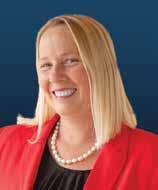
As the pandemic progresses, many of the former rules and regulations have since changed. Many small businesses have needed to continually update their practices and policies as their individual states have reopened, increasing traffic and person density in their establishments once again.
With that said, many of the procedures that are instituted today likely won’t remain as we begin to phase out of this era. For example, guest metering practices may shift as we continue to make strides to get life, as well as business, back to “normal”. Be sure to take the time to educate your employees on current rules and regulations, help them adapt, as well as direct them to where they can find the most up-todate information. Most importantly, employers should implement strategic training to ensure that their employees understand what is expected of them, how to conduct themselves, as well as how to interact with customers as business practices continue to fluctuate.
Offer a Helping Hand
As small business owners, it is important to understand that this
“new normal” is in fact not normal at all. Many employees are experiencing nervousness, depression, and/or anxiety as a result of this pandemic, and they can greatly benefit from receiving a helping hand from their supervisors.
To help combat their feelings of worry and stress, host frequent meetings that allow ample time for employees to ask questions. Take the time to hear them out and answer them honestly, as they are also having trouble navigating these uncertain times. Employers should keep a consistent, open line of communication so that their employees can feel comfortable coming to management if they need help or someone to talk to about the current situation. By being more flexible and allowing employees to take time for themselves, they will feel much more at ease and create a better sense of togetherness during this difficult time.
The COVID-19 pandemic has flipped the workplace upside down for many employees. In order to navigate this unique situation, implementing training that covers new procedures, regulations and rules will only help them feel more confident in themselves and work more efficiently as they brave this new era.
To learn more, head to the website: http://smallbusinessemployeetraining.com/
[ FEBRUARY I MARCH 2021 ] WWW.SBTMAGAZINE.NET 15 EDITORIAL FEATURE
Heather Bendinelli is the co-founder of Small Business Employee Training.
How to Make Extra Income While Helping Your Community
BY JAMES BONADIES
Local businesses are the pillars of our communities. They’re the places we see every day as we go about our lives, giving our neighborhoods their unique vibes. Businesses where we know the owners by name and don’t need a menu before placing an order are the lifeblood of our local communities. Now with the rapid proliferation of corporate big box stores and e-commerce—and, more recently, the COVID-19 pandemic— our local businesses are being threatened. But there’s an opportunity in this crisis for those who are willing to grasp it: we can help local businesses survive and thrive, and make money in the process. I’ll show you how.
How local businesses benefit communities
Small businesses make up 99.9% of all businesses in the United States, where they keep wealth within our communities, our municipal coffers solvent, and people employed.
• According to the U.S. Small Business Administration, small businesses have generated more than eight million new jobs since the turn of the millennium — twice as many as corporate giants.
• Our neighborhood businesses pay local taxes and are not subject to big corporate tax breaks, which means they help generate revenue for our schools, streets, and public works.
• Local businesses are hotbeds of diversity, since 29% of them are minority-owned. How many corporations can claim that?
How to help local businesses and make money, too
There are 29 million businesses in the United States alone, and they all need
the same thing: customers. This is where you can help: become a bridge between local businesses and the customers they need to survive will not only better the commercial landscape in your community, it will also allow you to develop your own local business in the process.
How to help local businesses and make money, too
1. Start local, stay local. We all think we know our neighbours, but when was the last time you schlepped over to the local hardware store instead of going to Lowes? Do the workers at your neighbourhood diner know you by name? Are you up to date on the challenges that the local businesses in your community currently face?
Hit the streets and get to know your local entrepreneurs. Participate in meet-ups and events. Shake hands, make friends, and pass around your business cards.
2. Use your personal social network. Since your focus is on the businesses in your community, start as local as you can get: your inner circle. Do you have an old buddy who manages a restaurant? Does your brother-in-law own a bar? Does your mother gab with the gals at the hairdresser? In local communities, people talk. Put out the word that you can help these local businesses get more customers and watch the referrals roll in.
3. Offer a service that local businesses already need and want. If you follow my directions, you’ll be providing a service that most entrepreneurs desperately need. By leveraging simple communications
technologies that you’re already using in new ways, you’ll increase your clients’ online visibility.
4. Activate the Baby Yoda strategy. When you get your first client, start by offering simple services, then scale up as you prove your worth and build trust. For your first contract, offer a service like providing positive reviews on Google Maps. You can gradually offer more advanced services, and watch your income rise exponentially.
5. Take a training course. I’ve made over seven figures per year operating a bridge business in my community and you can, too. It is important to find a training course that will show you exactly how to do this, and an expert who can coach you through each step on your path to success.
Become a neighbourhood saviour
Imagine for a moment what your community would be like without local businesses. If the only places to shop, dine, and hang out were big box stores and monotonous chains. Local businesses not only stimulate local economies, they also invigorate tax bases, provide jobs for your friends and neighbours, and make your community vibrant, unique, and full of flavour.
All over the country our local businesses are in trouble, so do your part to help them stay alive … and make yourself a little money while you’re at it.
James Bonadies Co-Founder Local Marketing Vault https://localmarketingvault.com/

16 SMALL BUSINESS TODAY MAGAZINE [ FEBRUARY I MARCH 2021 ] EDITORIAL FEATURE
Keeping the Talent You Are About to Lose
BY TOM BLOOMER
It may be hard to imagine after the crazy year that was 2020, but your best employee talent is about to leave. What is not hard to imagine is that overall employee satisfaction is at alltime lows. SMB owners and leaders must take responsibility now to keep their talent at home. 2020 was not your fault but losing key talent in 2021 will be.
This does not mean you are destined to lose all your top talent. It simply means you need to be doing the important things now with your team. A few key steps can make all the difference.
Stay in touch
Communication is essential in any time of crisis. You may not have all the answers. But your team needs to hear from you now, more than ever. Top talent is often overlooked because they have always been so self-sufficient. Today, they are now potentially your most vulnerable. Getting out there and communicating every day is now job #1.
Share the pain
Your team is probably going through a lot of pain right now. Beyond even job performance concerns, every team member has untold personal crisis weighing on their mind. They need to count on you as a leader. You need to share their pain. You need to show them you are right there with them. You do that by doing things you weren’t doing in the past. You don’t share the pain through talk. You share the pain through actions. You might normally not be in the weeds with your team, but now is a good time to get your hands dirty. Spend time working with them in the trenches. You may not have all the answers for them, but they will know they’re working with a leader who cares about what they’re experiencing.
Align with your team
Empower your team to bring ideas. Spend time aligning the path you need to be on as a business with the path they need to be on to envision their future as a part of your business. Being aligned with your team is only successful when they feel and see the alignment. Want to keep them when things open? Have them aligned today.
Encourage creativity
Want to reduce stress on your team? Let loose their creativity. We all struggle when problems are out of our control. Find ways to give your team activities they can control. Work with them on ways they can personally grow and develop. Empower them to seek new avenues to drive traffic, drive sales, increase their future commissions. Invest in your employees reinventing themselves and even their roles. Let them find new ways to engage with their prospects, and keeping the talent, you are about to lose customers so that everyone feels aligned and creative together. Your top talent wants to achieve, find ways to let them.
Understand it is about a lot more than compensation
Just as we learned through the 2008/’09 recession. The SMB world and today’s labor market has been changed forever. When things begin to open, top talent will not be swayed by money alone. As most SMB’s learned back then, employees have now seen firsthand how quickly compensation and security can vanish. Talent will stay where they feel they belong. Where they feel appreciated and a strong part of the future of that business.
Finally, inspire your team to water their grass
We all know the grass always looks greener across the street. Truth is that the grass is greener where it is watered. Inspire this understanding in your team. Help them to water their grass and let them see the grass is greener working with you moving forward. If you do not open their eyes it will always look greener across the street. Begin to help them water it at home.
Talent voids are being created in today’s labor market in every region and industry. Shortly these voids are going to be filled. Take steps today to ensure it is not your talent that fills them.
Tom Bloomer, Founder of Bloomer Associates and Co-Host of “Ok Boomer Teach me Sales” Podcast tom@bloomerassociates.com www.okboomerteachmesales.com (919) 267-9871

[ FEBRUARY I MARCH 2021 ] WWW.SBTMAGAZINE.NET 17 EDITORIAL FEATURE
Sales Tax Changes That Will Impact Small Businesses in 2021
BY LIZ ARMBRUESTER
COVID-19
defined 2020 and will strongly influence 2021. Everything from learning to shopping to working was dramatically changed as the pandemic set in. But, what about the changes to tax compliance? While it may be too soon to tell what changes are to come for sales and use tax, it’s hard to ignore the impact the pandemic has had on state and local governments this year. Revenues have declined in most states and the longer the pandemic lasts, the more pressing it will be for states, cities, and counties to balance their books.
As we move into 2021, here are two trends in tax compliance that small businesses should be aware of as they plan and adjust their strategies.
Taxability may expand to exempt goods and services
While it’s highly unlikely that states will add to the economic burdens of taxpayers by raising sales tax rates, there is the likelihood that states could expand their tax base to drive new revenue streams. Some of the products and services that have been in high demand throughout the pandemic, like groceries and digital goods, are currently exempt in many states. However, broadening the tax base to include traditional tax-exempt goods and services can be a less regressive tax policy move for states to recoup revenue losses.
We’ve already seen attempts by several states to expand their tax base. Facing significant budget woes due to the pandemic’s impact on key industries, the state of Wyoming attempted to put a tax on groceries, but the bill was voted down immediately. On the digital services front, Maryland, Nebraska, New York, and Washington, D.C., all proposed new taxes on digital advertising services in 2020.
For small businesses carrying tax-exempt goods and selling tax-exempt services, it will

be important to monitor for similar legislation in 2021. Due to the widespread nature of digital advertising and other services, as well as the regularity of grocery, expanding the tax base could provide a source of much-needed revenue for governments.
Unregistered online sellers could face penalties
According to McKinsey, 10 years’ worth of U.S. ecommerce adoption was compressed into three months in 2020. As a result of this ecommerce acceleration, more small businesses are actively engaging in online sales. While digital commerce has offered small retailers a reprieve to continue reaching customers amid restrictions and shutdowns, it also comes with a hefty tax burden.
More than 43 states, the District of Columbia, and some local governments in Alaska now tax remote sales via economic nexus, meaning the connection that creates a tax obligation (nexus) for a business is based on sales or transaction volume rather than physical presence. To date, we’ve seen many states observe an unspoken grace period for the enforcement of these laws, but as revenues dry up governments are under pressure to increase audits as soon as possible.
Small online sellers are ideal targets for economic nexus audits because many are unaware of the laws or that they have created new obligations through sales. And, due to the rapid nature of ecommerce expansion in 2020, the likelihood that sellers are unaware of new obligations or are missing correct registrations is heightened. Some states have already drawn a line in the sand when it comes to enforcement. In October 2020, Kansas Revenue Secretary Mark Burghart said the department intends to go after non-compliant remote sellers, starting with large sellers before moving on to small sellers.
18 SMALL BUSINESS TODAY MAGAZINE [ FEBRUARY I MARCH 2021 ]
EDITORIAL FEATURE
continued on page 23
How California’s New Cybersecurity Law
BY MICHAEL MONYOK
Amajor new cybersecurity law, the California Consumer Protection Act, recently became enforceable. And while the CCPA shares similarities to other states’ laws concerning personal data, it goes further than most statutes, mainly in that it allows individual California residents to bring a private cause of action against a business in case of theft or disclosure of non-encrypted or non-redacted personal information.
That’s a notable development, as it gives Golden State consumers more agency than they’ve had in the past, when companies struck by data breaches or misusing information mainly faced civil penalties. But this statute is not limited to California’s borders.
Similar to when the European Union’s wider-ranging General Data Protection Regulation (GDPR) went into effect, businesses everywhere must be aware of the CCPA. Any entity considered to “do business” in California, regardless of their physical location or residency of their employees, could be subject to the jurisdiction of California courts and enforcement.
What the law says
As the name implies, the CCPA gives California consumers broad rights regarding how businesses collect, use and share residents’ personal data (including but not limited to names, postal addresses, email addresses, personal identifying numbers and IP addresses). It also creates obligations for businesses pertaining to data collection and rules for retaining and selling data.
A business is subject to the CCPA if any
of the following apply:
• Has at least $25 million in annual revenue
• Holds more than 50,000 California users’ or devices’ data
• Derives more than 50% of revenue from selling data
Crossing state lines
A business headquartered on the east coast may not want to ignore what’s happening on the west coast. Given the amount of online commerce occurring within a state that is the world’s fifthlargest economy on its own, the CCPA will have ripple effects. If a business holds enough data from California residents, it does not matter if it is Newport Beach or New Jersey.
For example, a Pennsylvania-based clothing manufacturer may fulfill orders from a shop in California and have access to customer data. If the manufacturer has a breach on its servers, exposing personal information, who is responsible? The manufacturer or the company that originally collected the information? Certainly, the latter could be targeted for enforcement, but will it be able to pin the blame on the manufacturer? These are situations that remain to be seen.
Covering your business
There is something of an irony when it comes to cybersecurity. Even with a constant flow of headlines about data breaches or mishandled data, not enough companies make it a priority. Setting up a firewall or outsourcing the work to an IT company is not always enough. With more laws coming into effect and a greater public awareness of data privacy issues, passive measures
must be replaced with active efforts to protect information.
Following the Cybersecurity Framework developed by the National Institute of Standards and Technology (NIST) can be considered a baseline for reasonably protecting consumer data and personal information. It is an evolving and voluntary guidance that provides standards, guidelines and practices for organizations to manage and reduce cybersecurity risks.
At a contract level, any time there is going to be a transfer of data between parties, they should determine what precautions will be in place — and who is responsible for the data. This might be done similarly to contracts concerning intellectual property, which normally include specific wording and repercussions for accidental disclosures. In that case, a contract provision regarding data privacy may state a vendor is only responsible for data necessary to the contract, describe what penalty is involved if a party is directly responsible for losing the data, list what is considered a reasonable level of cybersecurity, and indemnify the other part against any claims of wrongful misuse of data or breach that occurs.
Measures like these are wise for companies everywhere, not only in California. From coast to coast, modern practices dictate that businesses are sure to handle data at some level, so they must take cybersecurity seriously.
Michael Monyok, Partner, Meyer, Unkovic & Scott

[ FEBRUARY I MARCH 2021 ] WWW.SBTMAGAZINE.NET 19
MGM@MUSLAW.COM EDITORIAL FEATURE
Might Affect Your Business (Even if You Aren’t in California)







20 SMALL BUSINESS TODAY MAGAZINE [ FEBRUARY I MARCH 2021 ] D E S I G N I N G F O R Y O U R S U C C E S S ™ DesignsbyMalka.com / P:713.667.5389 Design ™ DESIGNGRAPHIC 10%OFF MentionPromoCode:0221 andreceive10%discount ofyourfirstorder
The Value of CEO Personal Power
BY JOHN E. QUINLAN
IT ALWAYS BEGINS WITH THE BOSS.
The CEO of a manufacturing company impacted by Covid-19 requested a coaching session. Visibly dismayed, he shared with the executive coach how his leadership team seemed unresponsive to the company’s sense of forlornness. He described a company cultural drift, disconnection and even alienation. What should he do?
The coach said, “If I separately asked each of your department heads to describe how you impact them, what would they say?”
CEO: “Well, I never thought much about that. I assume they would say I’m a nice, reasonable guy. I give them space to figure things out and make decisions without much interference. I really let them run on their own until a mistake is made or an unfortunate event occurs. Then I get more involved and lay down the law on how I see things and what the solutions should be. Otherwise, if it isn’t broke don’t tinker with it. … I am not emotionally expressive in the first place. It’s all about performance.”
The coach handed him a short list and said, “Please take a look at these three power buckets. What bucket or combination of buckets characterizes you today?” The list said:
1. Abusive impact: You dominate and drive fear and insecurity in your subordinates to get things done. Ordering, disempowerment, perfectionism, arrogance and a lack of listening describe you.
2. Avoidance impact: You are afraid/reticent to own and use your power. You agree when you actually disagree, give false compliments, are uncomfortable holding individuals accountable, show excessive caution and want to be liked.
3. Affirmation impact: You esteem others for their effort, and for what they know as opposed to what they don’t know, and yet are firm about performance expectations. You show empathy, atonement and engagement. You inspire and develop others.
The CEO, now quite focused, said cautiously, “I hope number 3, but more than likely I am somewhere between number 2 and number 1, moving toward number 3.”
The coach leaned in. “The critical insight I am conveying to you is this: It is not about identifying the dominant bucket in this power repertoire, although this is useful. It’s about the lack of awareness you may have about your personal power and how you impact others with it. But you can remedy this. Look inside yourself. Give time for insight and self-reflection. During this pandemic, your organization either feels your influence or it doesn’t, and if it does, what does it see and feel? Your executive team reflects you. If they’re not getting a grip on the company drift and disconnect, it’s time for you be truly open with them, rather than just crack down.
“You need to understand your power to affect the climate. How to create psychological safety for your team to tell you what you may not see due to your invulnerability and blind spots. They need to feel you as engaged and supportive, as encouraging critical feedback from them, as moving the company through the crisis intact and emerging to strongly compete.”
The CEO leaned back, thought, and said, “What is all this worth bottom-line?”
Coach: “There was a really influential study that Daniel Goleman wrote about in the Harvard Business Review. The study covered return on

[ FEBRUARY I MARCH 2021 ] WWW.SBTMAGAZINE.NET 21 EDITORIAL FEATURE
continued on page 23
Wisely Breaking the Industrial Dam
BY ALI SHIRZADEH CHALESHTARI

In every industry, an industrial dam is a bunch of conventions that most of the producers or service providers obey and therefore those conventions are firmly expected by the market. An industrial dam is usually emanated in the product (or service) characteristics and it is not just about the minimums. It also defines the excessive features. Normally, a business will not be able to survive or compete if it does not move within the barriers of the industrial dam, unless it breaks the dam in the right way and at the right time, and takes the correct supportive actions. In such case, the success usually brings much prosperity as the novel actions stand as a differentiation factor.
The most common underlying rationales to break the dam are as follows:
• Differentiation. If your business is experiencing or anticipating fierce competition with the rivals in the market, you may not have enough time or resources to renovate your products or services. Under such conditions, one of the best strategies can be product differentiation according which one or few enhancements are made to the current products such that they turn different in a positive manner. Note that the enhancements are to be as simple as possible to meet the urgency. This solution is generally temporary as the simplicity of differentiation gives the rivals the opportunity to replicate the action, but on the bright side, it can keep you in the competition for a while, establish your tradename, and provide you the time and resources necessary to obtain more lasting differentiation factors.
• Discovering new needs. Wants, whatever the customers seek in a product, are entirely in response to some existing needs of the customers. However, needs are initially unknown even to the customers. When they turn apparent and transform to wants, they create long lasting business opportunities. Fulfilling needs may be easily practicable, while identifying them may
be very complex, requiring creative thinking and examining relaxation of restrictions forced by the industrial dam.
• Specializing. Many products or services which are offered to a wide range of customers can be specialized for more specific target groups. Although this initially makes the target market smaller, this may enhance the competition capability. To attain this, market clusters are to be known on various measures and studied meticulously to find their specific needs around the core product.
• Bundling. Bundles are those products and/ or services which are offered together as they are expected to be demanded simultaneously. Bundles are very good solutions for increasing sales of less demanding, expiring, unknown products, or products that have a fierce supply competition. On the large scale, shaping bundles normally require big data analysis to find the patterns of market behavior. On the small scale, it can be mostly the matter of needs identification. High demand products and services of a business are the starting points of the research in this regard, in order to find the other items or services which would supplement or appeal to the base.
The following are the most helpful and supportive actions of breaking the industrial dam:
• Introduce the innovation. Extensive marketing measures, both directly and generally are to be taken in order to make sure that customers understand the innovation.
• Explain the philosophy. Marketing endeavors are the way to illuminate the philosophy. The concept of
22 SMALL BUSINESS TODAY MAGAZINE [ FEBRUARY I MARCH 2021 ]
EDITORIAL FEATURE
continued on next page
continued from page 13
Make sure you can take care of the people who take care of your business.
If there is one thing this pandemic has taught me, it’s that being nimble and open to change can be your biggest asset to keep your small business alive when disaster strikes. And by using what you’ve learned during the COVID-19 pandemic to build contingency plans for other emergencies, you’re making your small business even stronger and more resilient in the face of a challenge.
Joseph Pascaretta is the General Manager of Credibility at Dun & Bradstreet, a leading global provider of business decisioning data and analytics. In this role, Joseph is responsible for the strategy, product development, and sales efforts for the company’s Credibility business and small to mid-size business portfolio. Contact him at pascarettaj@dnb.com, www.dnb.com
continued from page 14 adjusted in both tone and cadence to fit current pandemic expectations. Marketing in a crisis will cause for a more agile approach, with constant adjustments to align with changing customer sentiment.
During uncertain times, business leaders have an added layer of responsibility to all relevant stakeholders – from keeping the lights on and ensuring jobs to providing unwavering and honest customer experience. As an entrepreneur myself, I recognize this isn’t easy. But by taking these steps, you’re heading in the right direction to weather today’s storm for a brighter tomorrow.
Adii Pienaar, VP, Commerce Product Strategy at CM Commerce cm-commerce.com
continued from page 18
For small businesses selling online, understanding economic nexus laws and any obligations they may have will be essential in 2021 to avoid audit penalties and disruptions to customer service. Managing the myriad of tax laws across the U.S. can quickly become overwhelming, so tax automation solutions will likely be a critical tool for small businesses to manage tax compliance.
Effective tax compliance will have a direct impact on small businesses in 2021 as they expand their online presence and governments work to drive revenue through sales tax. Small businesses that enlist the support of tax technology will spend less time managing tax without compromising the accuracy needed to comply.
Liz Armbruester, SVP of Global Compliance, Avalara liz.armbruester@avalara.com, www.avalara.com Contact: SBossom@columbiabank.com or (877) 272-3678
continued from page 21
sales, revenue growth, efficiency and profitability. Goleman concluded: ‘Leaders who used styles that positively affected the climate had decidedly better financial results. … Our analysis strongly suggests climate accounts for nearly a third of results.’
“So I suggest,” the coach said, “instead of staying aloof until there’s a big mistake, you personally need to make your organization’s climate fertile. It starts at the top and waterfalls from there. Use your power to help your managers engage and care. Let them see that it’s OK not to be OK.”
The CEO stood up. “OK, let’s do it. I’m telling my CFO she can hold off on the proposed cutbacks. I will convene my group now and vet out a plan, starting with me, to get our company through this crisis.”
This CEO’s remedy begins with himself (the boss). Use your power wisely.
John E. Quinlan, author of Alignment Strong www.johnequinlan.com (313) 704-0059 Email: john@johnequinlan.com
continued from page 22
marketing has to be focused on the philosophy and implemented by making it known to the customers.
• Illustrate the applicability. Different circumstances are to be explained where the product novelty may be applicable.
• Train the usage. Training the method of usage by all measures even for the potential customers, strongly intrigue them in making purchases.
• Provide test opportunities. Once customers examine a new product or service, not only they practically learn how to use the new creation, the need behind that becomes apparent for them and possibly turns to want.
• Compensate possible losses. Product return opportunities and satisfaction guarantees are great measures to rectify customers’ concerns of the monetary loss. The demand increasing capability of these facilities usually overweigh their expenses.
Ali Shirzadeh Chaleshtari
Research Scholar, University of Massachusetts Boston ali.shirzad63@gmail.com (857) 233-7627 https://www.linkedin.com/in/ali-shirzadeh-phd-3243b437/
[ FEBRUARY I MARCH 2021 ] WWW.SBTMAGAZINE.NET 23 EDITORIAL FEATURE

24 SMALL BUSINESS TODAY MAGAZINE [ FEBRUARY I MARCH 2021 ] ADVERTISERS INDEX FEBRUARY I MARCH 2021 EDITION HOUSTON 9 Autism Speaks - Ad Council 20 Designs by Malka 2 Eusery Team - Texas United Realty 20 Gwen Juarez Photography Inside Front Cover LiftFund 24 Optima Vitamins Back Cover Phil & Derek’s Restaurant & Jazz Bar Inside Back Cover WBEA

[ FEBRUARY I MARCH 2021 ] WWW.SBTMAGAZINE.NET 25


 President Barbara Davis-Levine
EVP/Executive Publisher Steve Levine
President Barbara Davis-Levine
EVP/Executive Publisher Steve Levine





















 BY JOSEPH PASCARETTA
BY JOSEPH PASCARETTA

















